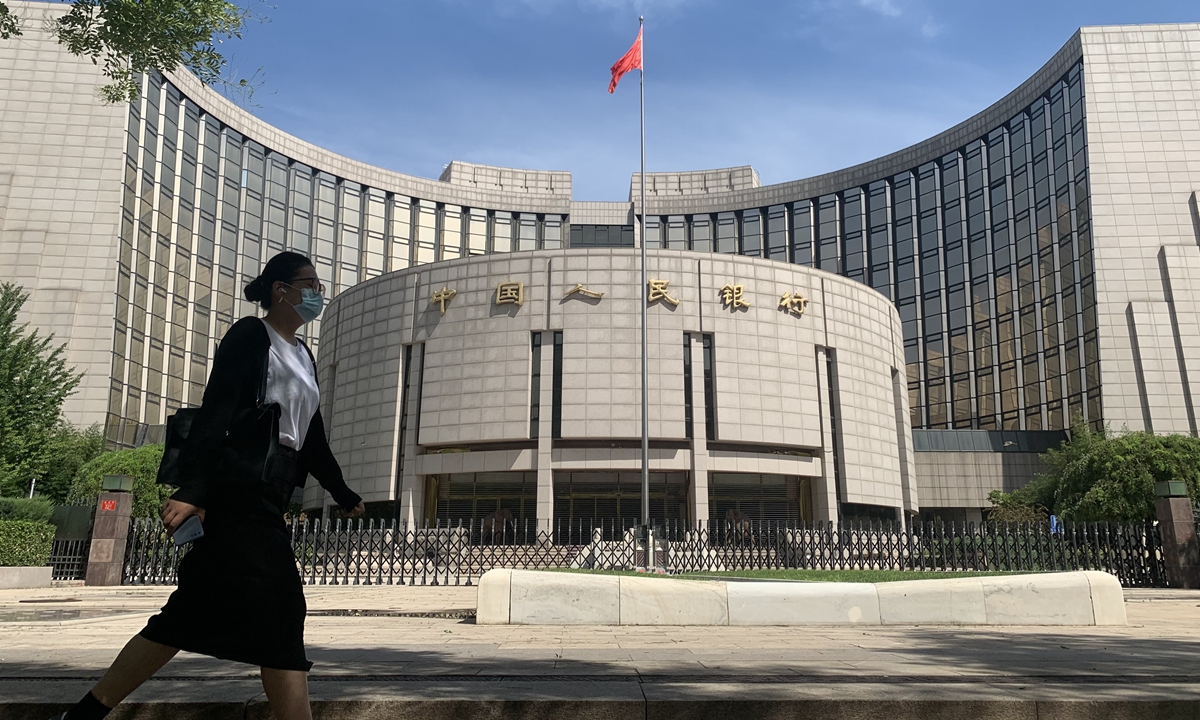China's central bank vows to use multiple policy tools to ensure a steady economic recovery in H2

A view of the PBC building in Beijing on August 22, 2022. Photo: VCG
The People's Bank of China (PBC), the central bank, on Tuesday vowed to use multiple policy tools to ensure reasonable and sufficient liquidity, support the stable and sound development of the real estate market and tackle major financial risks, as part of the country's intensifying efforts to ensure steady economic recovery in the second half of 2023.
The PBC's pledges on Tuesday come as various Chinese government departments move swiftly to issue measures to boost development in various aspects of the Chinese economy, including the private sector and consumption, after a tone-setting meeting last week, showing the country's efficient policy-making and implementation to stabilize economic development amid challenges.
The PBC and the State Administration of Foreign Exchange (SAFE) on Tuesday held a meeting on work for the second half of the year, vowing to precisely and forcefully implement macro adjustments and controls, strengthen counter-cyclical adjustment and policy reserves, and solidly promote high-quality economic development, according to a statement posted on the central bank's website.
Specifically, the meeting emphasized six areas, including macro policies, the foreign exchange market, the real estate market, prevention and resolving of major financial risks, financial opening-up and financial services and management levels, according to the statement.
The meeting vowed to continue to implement a prudent monetary policy accurately and effectively, continue to improve and stabilize market expectations, and create a favorable monetary and financial environment for the stable growth of the real economy. The PBC will comprehensively use a variety of monetary policy tools to maintain reasonable and sufficient liquidity, give full play to the role of aggregate and structural monetary policy tools, and vigorously support technological innovation, green development and the development of small, medium and micro enterprises.
On the real estate market, the meeting vowed to effectively implement exiting financial support policy targeting the real estate sector, increase financial support for property renting and construction of affordable housing. The central bank will continue to guide the decline of personal housing loan interest rates and down payment ratios to better meet real demand and home upgrades. It will also guide commercial banks to adjust interest rates of existing personal housing loans in an orderly manner.
In terms of the foreign exchange market, the PBC and the SAFE vowed closely monitor the fluctuation of cross-border funds, strengthen macro-prudential management and guidance of expectations, and keep the yuan's exchange rate basically stable at a reasonable and balanced level. Policies and measures to facilitate trade and foreign exchanges will be carried out, including improving the framework of cash-pooling services for multinational companies to integrate domestic and foreign currency management.
The meeting also vowed to expand international financial cooperation and financial opening-up, including simplifying the procedures for foreign investors to invest in the Chinese market, and enrich the types of investable assets, and facilitating foreign investors to increase their holdings of yuan assets, and promote the internationalization of yuan in an orderly manner.
The policy pledges from the PBC and the SAFE on Tuesday add to a number of previously announced measures by Chinese government departments to boost development in various aspects.
On Tuesday, eight Chinese ministries issued 28 measures to support the private economy, vowing to provide fair access for private firms to participate in major national projects and technological undertakings, among other measures, to boost the sound development of the private economy.
On Monday, Chinese authorities issued 20 measures to boost domestic consumption, including support for expanding real estate and auto sales, underscoring the country's intensifying efforts to ensure steady economic recovery and meet annual economic development goals amid internal and external downward pressures.
With all the measures targeting main growth drivers in place, the Chinese economy will likely see a stable recovery in the second half of 2023 despite downward pressure, analysts noted.

